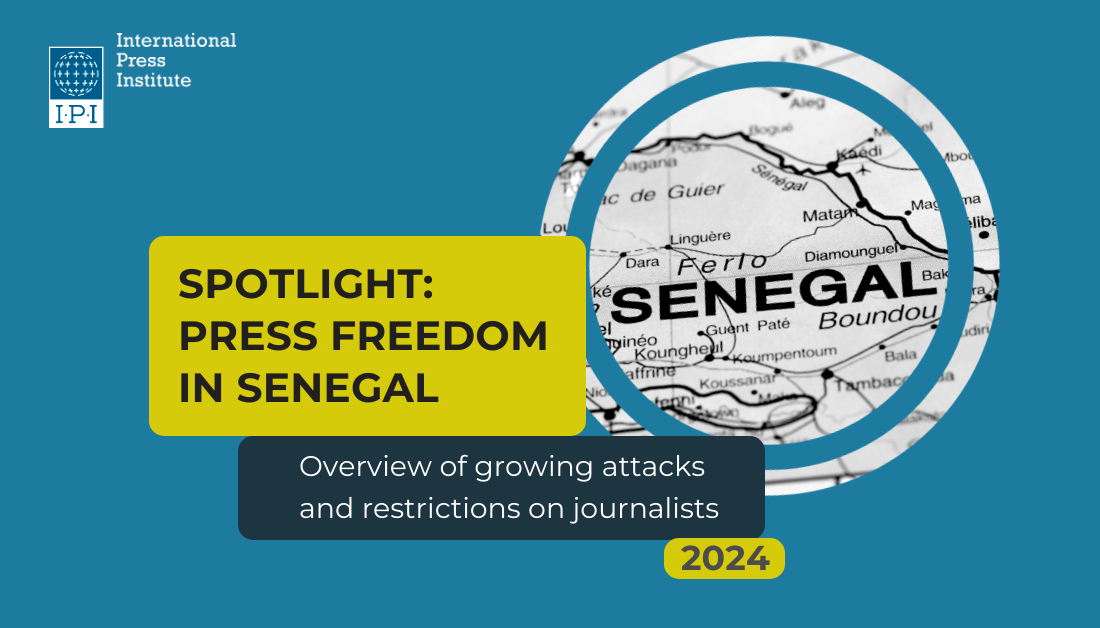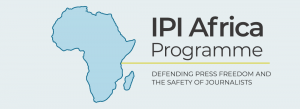Background
This International Press Institute (IPI) briefing highlights current press freedom challenges in Senegal. Additionally, it sets forth high-level recommendations on promoting and protecting press freedom and journalist safety.
In recent decades, Senegal has enjoyed a relatively high level of press freedom, serving as a model for other countries in Africa, and West Africa in particular. However, independent journalism has come under increasing pressure. This trend increased further over the last year amid political and social upheaval.
The election in March 2024 of opposition candidate Bassirou Diomaye Diakhar Faye as president offers an opportunity to highlight the need for improvements in the protection of journalists and media freedom.
Political environment
Pressure on journalists in Senegal increased in particular amid public protests that started in May 2023. These protests followed the sentencing of opposition leader Ousman Sonko to two years in prison for “corrupting youth”. The protests led to the deaths of at least 16 people, while authorities detained hundreds of others.
Protests erupted again this year after outgoing President Macky Sall postponed national elections originally scheduled for February 25. Senegal’s Constitutional Council later ruled the postponement unconstitutional and the elections took place on March 24
Journalists covering the election-related protests and the resulting crackdown by security forces faced repression. The authorities also blocked internet access twice in February. Meanwhile, coverage of the March 24 vote was itself, fortunately, largely peaceful and safe for journalists.
Overview of attacks and restrictions on journalists
IPI’s Africa program monitors attacks and restrictions on journalists across Africa. For the period beginning in January 2023, IPI documented an alarming number of attacks and restrictions on journalists in Senegal. The tally reflects an increase in such attacks amid political unrest and protests. Incidents include the suspension of media outlets, physical attacks on journalists, and arbitrary arrest and detention of reporters. While state authorities are responsible for most of the reported attacks, journalists have reported intolerance toward critical media from both the government and members of opposition parties.
Suspension of critical media
On several occasions, Senegal’s media regulatory body suspended Walf TV in response to coverage critical of the state authorities. Regulators suspended the broadcaster four times between 2021 and February 2024, including indefinitely withdrawing its broadcasting license in the last case. Authorities reversed the move on February 11 following local and international condemnation, including by IPI.
In March 2022, the regulator suspended ZIK FM and Sen TV over critical broadcasts on socio-political issues. In March 2021, it suspended SenTV and Walfadri TV for what it said was “irresponsible” coverage of protests taking place at the time. The frequency of such suspensions suggests an effort to pressure critical and independent media.
Attacks on journalists covering protests
Attacks on press freedom have soared amid anti-government protests, including in February of this year. Journalists covering protests have faced assault, detention, and threats. IPI monitoring identified 18 incidents of physical attacks on journalists, including seven female journalists, in February 2024 alone
For example, security forces arrested journalist Sokhna Ndack Mbacke of the online news platform Agora TV on February 4, while reporting live on the protests. On February 5, a group of gendarmerie officers harassed Hadiya Talla, a journalist for the news site La Vallée Info. He was forced to cease his live broadcast from the protests in Dakar. Officers also seized his phone. On February 9, security forces assaulted Absa Hane, a journalist for the online news outlet Seneweb, while covering the public protests, reportedly knocking her briefly unconscious.
Attacks on journalists have also occurred outside of the protests. On February 28, an unknown assailant attacked and stabbed journalist Maimouna Ndour Faye of 7TV near her home. Ndour Faye told IPI that she had been receiving threats because of her work and that she feared for her safety. On January 10, Babacar Fall, editor-in-chief of the radio station RFM, received a flood of messages and calls from unknown individuals threatening his life. The threats came after Fall’s comments on President Sall’s opening speech at the International Francophone Press Union conference.
Unlawful arrest and detention
IPI documented several cases of journalists arrested or detained for doing their jobs. In some cases, the detentions were short and authorities released the journalists without charges. In other cases, journalists remained in detention for longer periods, in some cases until a February 2024 amnesty law. For instance, authorities detained Cheikh Bara Ndiaye of Walfadjri TV on June 4, 2023 after he published a statement – apparently not to the authorities’ liking – with suggestions for ending the sociopolitical crisis. Nidaye was released the next month
In May 2023, authorities detained Maty Ndaye Niang, who works with the investigative outlet Kéwoulo, after she criticized the government on Facebook. That month, a court convicted her on six counts, including “undermining public security” and “usurpation of the function of a journalist”. She was released following the February 2024 amnesty law alongside five other detained journalists. Meanwhile, Pape Sane of Walf TV was arrested and later released in November 2023 over a Facebook post on the dismissal of a high-ranking officer from the security services. Authorities arrested Pape Alé Niang of Dakar Matin twice in November 2022 and once again in July 2023. The arrests were in connection with his publications on the arrest of opposition leader Ousman Sonko.
Additionally, authorities arrested Serigne Saliou Gueye of the daily newspaper Yoor Yoor in May 2023. He was released in June 2023 alongside Pape Ndiaye of Walf TV. Ndiaye was arrested in March 2023 over his comments on Sonko. Authorities also detained, and later released, journalist Babacar Toure of online news outlet Kewoulo in April 2023 over a story the authorities considered “false news”.
Internet shutdowns
Since 2021, Senegal has experienced a growing trend of internet shutdowns. Authorities have shut down the internet five times during that period. These restrictions seriously impact media freedom, free expression, and access to information as well as the rights of assembly and association.
For example, authorities blocked access to the internet in June 2023 during public demonstrations following the sentencing of Sonko. The minister of communications claimed that the shutdown was necessary to prevent the spread of hatred and violence.
The government also shut down mobile internet on July 31, 2023 and blocked TikTok on August 2 amid protests related to the opposition leader. The most recent mobile internet shutdown occurred in February 2024 in response to the protests over the election postponement.
Laws undermining media freedom
In December 2023, IPI published a toolkit on tools and frameworks for defending media freedom in Senegal. The toolkit also highlighted several existing legal provisions that undermine media freedom. These include provisions in the criminal code such as Article 254 on insulting the head of state, Article 80 on disrupting public order, and Article 255 on the dissemination of false information. Meanwhile, local press watchdogs have described the country’s Press Code as a Sword of Damocles over the profession, potentially leading to self-censorship. The code contains over 50 articles carrying sanctions.
Recommendations
The new Senegalese government must take action to protect, restore, and defend press freedom and journalist safety as pillars of democracy.
This action should include the following as high-level recommendations:
- Stop the legal harassment and detention of critical journalists.
- Security forces must refrain from attacking or harassing journalists.
- Ensure journalists can report safely and freely public protests.
- Authorities must investigate all attacks on media and journalists and bring those responsible to justice.
- Review and revise legal provisions limiting press freedom and freedom of expression in line with regional and international standards.
- End the use of internet shutdowns to block access to information of public interest. Senegal must respect and uphold international and regional principles – including those set forth in the African Declaration on Internet Rights and Freedoms – on access to information offline and online.

